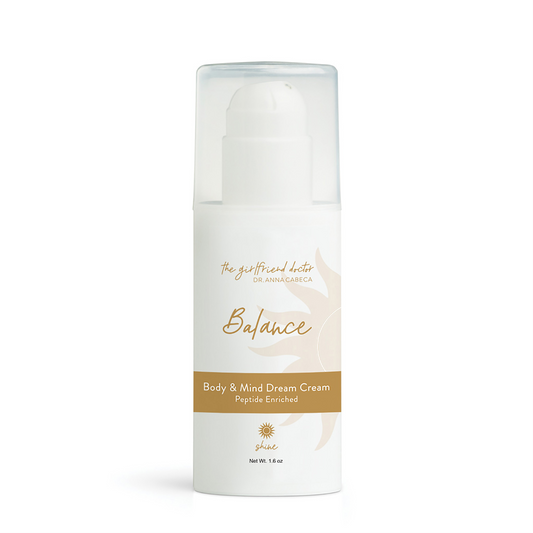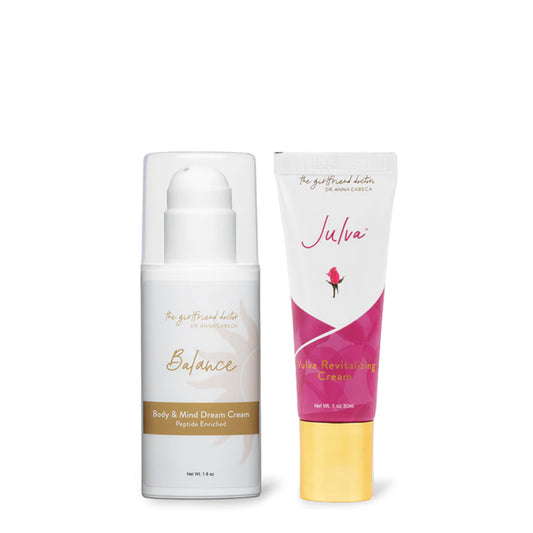When your body changes, so does your relationship—but that doesn’t mean the spark is gone.
If intimacy feels different lately—less frequent, less comfortable, or less connected—you’re not alone. Hormonal shifts, vaginal dryness, emotional changes, and life stressors can all create distance. But here’s the truth I see every day in my clinic and community: the biggest intimacy killer isn’t hormones—it’s silence.
I’ve helped thousands of women navigate the vulnerable (and powerful) conversation with their partner about what’s going on in their body, mind, and heart. I’ve also lived through big hormonal seasons myself. You deserve comfort, confidence, and connection at every age. Let’s talk about how to get there—together.
What You’ll Learn
- Why intimacy changes in perimenopause and menopause (it’s not your fault)
- Exactly what to say—even if you feel awkward or don’t know where to start
- Ways to rebuild closeness while supporting your body
- Tools to improve comfort, desire, and confidence—naturally

It’s not just in your head.
As estrogen, progesterone, and DHEA fluctuate and decline, your body often needs different kinds of care and connection. These changes can:
Reduce natural lubrication, leading to dryness or irritation
Increase sensitivity or discomfort with penetration
Shift desire and arousal patterns (less spontaneous desire, more responsive desire once you’re relaxed)
Impact mood, sleep, and body image
Add real-life pressures—caregiving, career shifts, aging parents, the mental load—and intimacy can start to feel like pressure instead of pleasure.
Many women experience genitourinary syndrome of menopause (GSM): vaginal dryness, irritation, discomfort with sex, urinary urgency, and even recurrent infections. Pelvic floor tension or old birth injuries and certain medications (antihistamines, some antidepressants) can reduce lubrication and desire too.
If any of this sounds familiar, you’re not broken—and you’re not alone. Your body is asking for new strategies and more compassionate communication.
The Biggest Intimacy Killer Is Silence
When things feel off, many couples avoid the topic. That avoidance breeds misunderstanding and resentment. Your partner may wonder if you’re not attracted to them; you may wonder if you’re somehow failing. Neither is true. Silence makes it worse. Conversation opens the door to solutions and closeness.
Exactly How to Start the Conversation (A Simple Blueprint)
Use this 5-step approach to talk about intimacy changes without blame or shame.

1) Choose the right time and place
Pick a calm, private moment—not right before or during sex, and not when either of you is tired or stressed.
Try a walk, a quiet coffee on the couch, or a planned check-in on the weekend.

2) Start with appreciation and purpose
“I love what we share, and I want us to feel close. I’ve noticed some changes and want to talk about how we can navigate them together.”

3) Share “I” statements and body data
“I’ve been feeling different lately. My body is drier and more sensitive than it used to be. It’s not about you—it’s what my hormones are doing right now.”
“Sometimes I feel pressure to perform, and that actually makes it harder for me to relax.”
4) Name what you want
“I want us to enjoy this new season. I’d love to slow down, use more lubrication, and explore what feels good now.”
“I want to prioritize comfort and pleasure for both of us, not just push through.”
5) Invite collaboration
“What helps you feel close to me? What would you like to try together?”
“Can we set aside some time to reconnect without expectations and just be curious?”
Conversation Starters (When You Don’t Know How to Say It)
“I’ve been feeling a little different lately and want to share what’s going on.”
“This isn’t about you. It’s about what my body is experiencing right now.”
“Can we explore new ways to connect that feel good for both of us?”
“I want to enjoy being close with you—and I need a little more time and comfort to get there.”
What to Say if Sex Is Painful or Dry
Pain changes everything—and you should never push through it. Try this script:
“I’m noticing burning or soreness with penetration. It scares me and makes me tense. I don’t want to avoid closeness, so I’d like to slow down, use more lubrication, and focus on what feels good. If the discomfort continues, I want to talk to my provider and try some topical support to help my skin feel better.”
What to Say if Desire Is Low
Many women in midlife shift from spontaneous desire (wanting sex out of the blue) to responsive desire (wanting sex once you’re relaxed and aroused). That’s normal.
“I don’t feel spontaneous desire like I used to, but once we’re connecting and I feel relaxed, desire shows up. It helps when we start slowly, without pressure, and focus on touch and play.”

Estrogen supports lubrication, elasticity, and blood flow. Lower levels can mean dryness and irritation.
Progesterone calms the brain (via GABA receptors). Declines can increase anxiety and disrupt sleep.
DHEA and testosterone support tissue health, energy, and libido. Changes can alter arousal and orgasm patterns.
Cortisol (stress) and oxytocin (bonding) work like a seesaw. High stress suppresses oxytocin, making it harder to feel safe and turned on.
This is biology—not a personal failing. When we work with your hormones (and your nervous system), intimacy often becomes easier and more enjoyable again.
Tools to Support Comfort, Confidence, and Connection
1) Moisture Matters
Vaginal dryness or irritation is one of the most common—and most fixable—barriers to intimacy in midlife.
Use Julva or Velvè daily to support skin comfort and elasticity.
Choose clean, hormone-free options that nourish rather than mask discomfort.
During intimacy, apply a compatible lubricant. Water-based options are easy to clean; silicone-based can be longer-lasting (avoid with some silicone toys).
Look for simple formulations and avoid fragrances if you’re sensitive.
2) Mood and Hormone Balance
Emotional shifts are real. So is the need for hormone support.
Mighty Maca Plus supports energy, mood, and adrenal resilience—especially helpful if stress or fatigue is draining desire.
Balance Cream can support skin appearance and promote a sense of calm. Balance is a cosmetic product. Always talk to your provider before using any hormone-based products.
Protect sleep, balance blood sugar, and offload stress daily—these are foundational for libido and comfort.
3) Connection Isn’t Just Physical
Intimacy thrives when oxytocin (your “love hormone”) is flowing.
Schedule time to laugh, talk, and play—without performance pressure.
Explore touch with curiosity: massage, holding, cuddling, and kissing can rebuild closeness.
Create rituals that build oxytocin: slow walks, cooking together, dancing, a 10-second hug, eye contact, gratitude.
A Practical 4-Week Intimacy Reset
Week 1: Safety and Comfort
Conversation: Use the blueprint above. Share openly and listen generously.
Comfort care: Start daily vulvar skincare with Julva or Velvè. Choose a clean lubricant for intimacy.
Stress offloading: 5–10 minutes of breathwork or journaling daily.
“Us” time: One screen-free, no-expectation date focused on connection.
Medical check: If pain, bleeding, or recurrent infections are present, see your provider or a pelvic floor PT.
Week 2: Touch Without Pressure
Sensate focus: A 20-minute “touch only” date—no genital contact. Notice what relaxes or energizes.
Green/Yellow/Red list: Each partner lists green (excited), yellow (curious), red (not now). Choose two greens to explore.
Micro-pleasures: Three small joys daily—sun on your face, favorite music, bath, stretching.
Week 3: Expand Arousal Gently
Start with relaxation (warm shower, massage oil, slow breathing), then add arousal.
Try new contexts: morning intimacy, a different room, guided audio meditations.
Support food and mood: protein-forward meals, mineralized hydration, and minimal alcohol.
Week 4: Integrate What Works
Debrief together: What helped? What didn’t? What do you both want more of?
Schedule future connection: one “no-pressure” intimacy time and one “date night.”
Keep body care and stress offloading going—you’re building a new baseline.
Common Partner Reactions—and How to Respond with Grace
If your partner feels hurt: “I hear that this is scary. I’m not rejecting you; I’m learning my new body. I want us to be close, and I need your help to make it comfortable and fun.”
If your partner wants to fix it immediately: “I appreciate your desire to fix this. What I need first is patience and presence. Let’s try the simple steps we discussed and see how my body responds.”
If your partner avoids the topic: “This feels awkward for both of us. I care about our connection. Could we try a 10-minute conversation and a 10-second hug each day this week?”
When to See a Professional
Seek care if you have:
Pain with sex that doesn’t improve with lubrication and gentle techniques
Bleeding after sex, severe pelvic pain, or a new lump or lesion
Recurrent urinary tract infections or vaginal infections
Severe low mood, anxiety, or relationship distress
A history of pelvic trauma, birth injury, or significant pelvic floor symptoms
Helpful resources: a menopause-informed clinician for GSM evaluation and personalized options; a pelvic floor physical therapist for pain, tension, or pelvic floor dysfunction; and a certified sex therapist or couples therapist for communication and intimacy coaching.
Lifestyle Choices That Quietly Help Libido and Comfort
Sleep is libido’s best friend. A regular bedtime, cool room, and wind-down routine improve desire and arousal.
Balanced blood sugar = better moods and better sex. Anchor meals with protein, healthy fats, and fiber, and avoid constant grazing.
Rethink alcohol. It may lower inhibitions but often worsens dryness, sleep, and arousal.
Move your body. Strength training and walking improve circulation, confidence, and energy—foundations for desire.
Communication Mistakes to Avoid
Don’t spring the conversation during sex or late at night.
Don’t blame or mind-read your partner’s intentions.
Don’t minimize your discomfort. Pain is information.
Don’t assume your partner “should know.” None of us are mind readers.
For Partners: What Actually Helps
Listen to understand, not to fix.
Ask, “How can I make this easier for you right now?”
Be patient. A relaxed nervous system is the on-ramp to arousal.
Keep flirting outside the bedroom—texts, compliments, inside jokes.
Celebrate small wins and new discoveries.
Start Here: Rebuild the Spark, Naturally
You don’t need to be anyone else’s version of sexy. You just need to feel comfortable, confident, and connected again—on your own terms. If you’d like guided support, consider:
Julva Trial Pack for 7 days of gentle, effective skin support
Vajayjay Quiz for personalized recommendations
Podcast episode (listen with your partner) on intimacy and hormone health
Mighty Maca Plus for energy, mood, and adrenal resilience; and Balance Cream for skin appearance and calm. Balance is a cosmetic product—talk to your provider before using any hormone-based products.

What if I don’t feel any desire at all?
Start by addressing discomfort (like dryness), lowering stress, and rekindling nonsexual connection. Many women have responsive desire—once relaxed and aroused, desire follows.
Is it okay to bring this up even if things aren’t “that bad”?
Yes. The earlier you talk, the easier it is to adapt together. Small conversations prevent big resentments.
My partner doesn’t understand—what do I do?
Share this article, or listen to a podcast episode together on hormones and relationships. Invite them into your experience with “I” statements and clear requests.
Are dryness and pain just part of getting older?
Common? Yes. Inevitable? No. Comfort can often be restored with daily care, lubrication, and, when needed, guidance from a menopause-informed clinician.
Can intimacy be satisfying without penetration?
Absolutely. Kissing, touch, massage, shared baths, mutual pleasure, and toys can all be intimate and fulfilling.
How do I tell my partner sex hurts without hurting them?
Be direct and kind: “I love being close to you. Lately, penetration hurts. I want to find ways to make this comfortable and pleasurable for both of us.”
How do I talk to my partner about intimacy during menopause?
Choose a calm time, lead with appreciation, use “I” statements about your body, name what you want, and invite collaboration.
Why does sex feel different in perimenopause?
Hormone shifts change lubrication, tissue elasticity, sleep, mood, and stress tolerance. It’s biology—not a personal failing.
What’s the first step if sex is uncomfortable?
Stop pushing through pain. Add daily vulvar skincare and clean lubrication, and see your provider if pain persists.
How can we reconnect without pressure?
Plan “touch-only” time, slow down, hug for 10 seconds, build oxytocin with walks and laughter, and keep flirting.
Can supplements help?
Many women find Mighty Maca Plus supports energy and mood. Balance Cream supports skin appearance. Balance is cosmetic; consult your provider before any hormone-based products.
When should I seek professional help?
If you have persistent pain, bleeding after sex, recurrent infections, or significant distress, see a menopause-informed clinician or pelvic floor PT.
Note: This article is for educational purposes and is not a substitute for personalized medical care. Always consult your healthcare provider for guidance about your specific situation.













